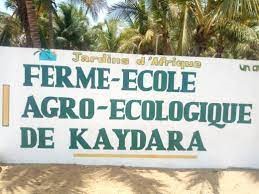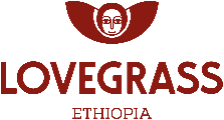DercolBags Packaging is a company that produces in Ghana eco-friendly and biodegradable packages to replace single-use plastic packages and eradicate plastic pollution. The company was presented at...

Gora NDIAYE is the president of the Senegalese association Jardins d’Afrique and the founder of the Kaydara agroecological farm-school. Gora trained in agroecology after having worked as a teacher in Dakar and as a project manager in several non-governmental organisations (NGOs), leading development projects with a social and environmental dimension. Following his training, Gora planted a coconut grove in the village of Keur Samba Dia (in the commune of Fimela in Senegal) and created the farm-school to provide young Senegalese with alternatives to rural exodus, and with training in agroecology.
Today, Gora is actively involved in the dissemination of agroecology in Senegal and other African countries. He also shares his knowledge at numerous seminars on this subject in Africa and Europe.

Type: Association
Year of Founding: 1994
Number of Employees: 9
CEO: Gora Ndiaye
Business Model
The Kaydara farm-school is an example of breaking away from conventional agriculture. Its objective is to make agriculture attractive to young Senegalese and to encourage them to engage in sustainable agricultural practices by offering them perspectives for the future. The Kaydara farm-school teaches young entrepreneurs about agroecological practices through training, information sessions and demonstrations, to enable them to promote agroecological practices in their own villages.
The farm-school is also a place to promote local initiatives for sustainable development.
The Kaydara farm-school is located in the commune of Fimela, a coastal commune in the Fatick region where salinisation affects more than 60% of the land. By setting up the farm-school in this area, Gora wanted to demonstrate that it is possible to make land – that is threatened by salinisation and desertification – cultivable without resorting to conventional agriculture. In 1994, Gora acquired a very poor and abandoned piece of land. The first plantations, mainly of coconut palms, were planted in 2003 and agriculture gradually developed. The Kaydara farm-school started to train young farmers in 2007.
Today, the Kaydara farm-school welcomes about 20 young people each year to teach them the knowledge and basics of agroecological practices. The Kaydara farm-school is one of the first agroecological farms in Senegal and in sub-Saharan Africa. Some of the produce of the farm-school is sold directly on the farm, or in sales outlets within a 50 km radius of the Kaydara farm-school
Strong Relationships with Senegalese (Future) Farmers
Every year, the farm-school trains about 20 young people from different regions of Senegal who meet various criteria, such as the student’s and their family’s commitment to the training, as well as the involvement of the local authorities. In addition, the student must own a plot of land from their family or the village community, on which they will develop their activity following the training.
Since 2021, expansion of the buildings within the farm-school has made it possible to welcome women among the students.
Main Services
The Kaydara farm-school offers a range of services.
Food production
All the produce of the farm-school is organic certified and intended either for feeding the residents of the farm-school, or for sale to the local population.
Various fruit and vegetables are produced, such as: cabbages, carrots, zuchini, peppers, mangoes, citrus fruit, onions, dates, papaya, aloe vera, strawberries, as well as tree nurseries of coconut, mango, cashew, moringa or “never die” trees, medicinal plants and spice plants.
The farm also breeds sheep and poultry.
Agricultural mechanics workshop
The association Jardins d’Afrique has created an agricultural mechanics workshop. This workshop was built with the support of the DIOKO association and equipped by the University Institute of Technology (IUT) in Poitiers, France. It meets the needs for equipment and tools, and provides facilities to carry out repairs as needed.
Solidarity tourism and visits
In addition to activities directly related to agriculture, the Kaydara farm-school welcomes tourists who wish to share some time with the young entrepreneurs by participating in the farm-school activities. Every year, the farm-school also welcomes groups of students and young people in integration structures to help them discover the environment around the school and in Senegal.
Innovations: Milestones and Expansion Plans
In general, agroecology and those who practise it need to be better supported by policies, especially local policies, in the preparation and implementation of local development plans and the linked financial investments.
Beyond the activities of the Kaydara farm-school, there is a need to support technical and financial capacity building for young people, as well as relationships with producer organisations, and the creation of jobs for young people and women.
Success Factors and Lessons Learned
The concept of the Kaydara farm-school is very popular with the local population, and is attracting considerable interest abroad, particularly thanks to its media coverage including several recent reports. Its approach – combining sustainable agricultural production, reforestation of arid areas and protection of biodiversity, employment opportunities for young farmers, and quality products in local markets – makes it an attractive model in areas often abandoned by young people.
In 2016, thanks to support from the municipality of the commune of Fimela, 17 small farms were constructed in the villages around the farm-school to enable the trained young farmers to work on their own farms. In addition, students trained at the Kaydara farm-school have also set up farms in other communes and regions of Senegal. These farms contribute to the creation of a food belt that strengthens food security.
The young people who receive training become ambassadors for agroecology in their locality, and can become trainers by sharing the principles they have learned. For example, farmer-trainers based near the Kaydara farm-school deliver part of the training programme, which allows them to continue their own learning.
The Kaydara farm-school has developed strong relationships with neighbouring municipalities, such as Fimela, Diofor, Palmarin, Djilass and Loul Sessene, in which local elected officials are committed to promoting and disseminating agroecology. Various partnerships have also been set up between the farm-school and organisations such as NGOs, citizens’ movements and universities (e.g. Université Sine Saloum El Hadj Ibrahima Niass, USSEIN, in Kaolack, Senegal), to converge synergies and knowledge, and to promote agroecology and local development by keeping young people in rural areas.
The Kaydara farm-school contributes to the protection of the environment, restoration of biodiversity, creation of green jobs by promoting rural entrepreneurs, and promotion of family farming. It enables the trained entrepreneurs to meet their needs and develop food self-sufficiency, thanks to the diversification of agricultural production.
Additional Resources
Join our Agrinnovators community forum to discuss and explore how to encourage innovations across agricultural value chains to transform food systems in Africa, promote sustainable agriculture, and leverage investment. Share insights, ask questions, and collaborate on innovative solutions for a greener future
Recent Business Profiles

DercolBags Packaging is a company that produces in Ghana eco-friendly and biodegradable packages to replace single-use plastic packages and eradicate plastic pollution. The company was presented at...

JOULEU is a Senegalese horticultural company that contributes to food self-sufficiency in Senegal and the sub-region while promoting agro-ecology and integrating digital transformation into...

GIPA FOODS & GENERAL SUPPLIES LIMITED provides smallholder producers with a cassava processing solution that reduces post-harvest losses by adding value to the crop. The company was presented in...

BioLife Tech provides digital solutions that connect pineapple growers in Benin with local processors, exporters and traders, and enable technical monitoring.They presented at Innovation Session...

Lovegrass LTD is a company that manufactures teff-based products. They presented at Innovation Session n°16.